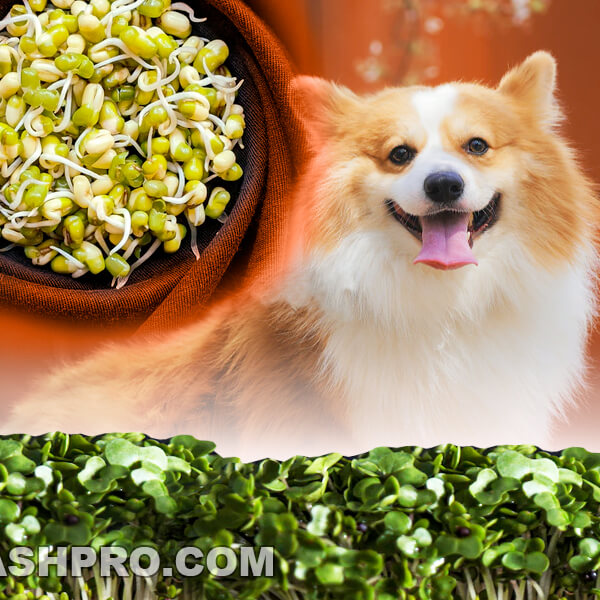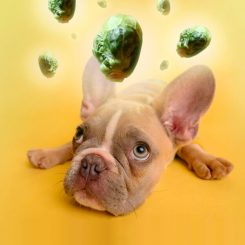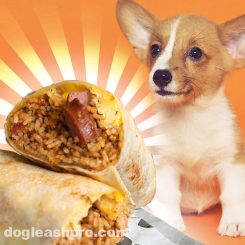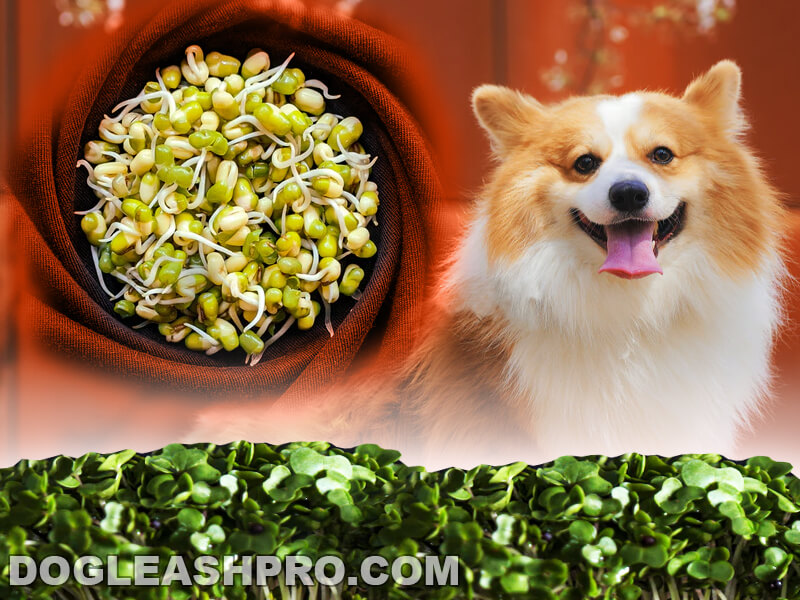
Bean Sprouts are a superfood that goes well in many different dishes. Fresh Bean Sprouts have an earthy smell and a subtle nutty flavor. They contain high water content and are a bit crunchy. While you’re adding this vegetable to your dish, you’re probably wondering can dogs eat Bean Sprouts and are they safe for doggy consumption. Let’s dig in and find out!
Can dogs eat Bean Sprouts? Yes, dogs can eat Bean Sprouts in moderation as this vegetable provides tons of health benefits to dogs and have very few calories. Bean Sprouts are packed full of vitamins, minerals, and nutrients and are very easy to digest.
Table of Contents
Can dogs eat Bean Sprouts?
Absolutely, dogs can eat Bean Sprouts. There are some human foods that our furry friends can safely eat and Bean Sprouts is one of them. This watery yet tasty vegetable can be added to spring rolls, salads, chicken noodle soups, stir-fry dishes, or even sauteed with other vegetables like carrots, zucchini, and broccoli.
The best part is that Bean Sprouts are both healthy and nutritious for our canine friends. Did you know that Bean Sprouts can produce up to 800% more nutrition than your average fully grown vegetables? This means they are nutrient-dense.
Dogs can eat Bean Sprouts both raw or cooked. Let’s dig deeper and see why Bean Sprouts are good for dogs.
Are Bean Sprouts good for dogs?
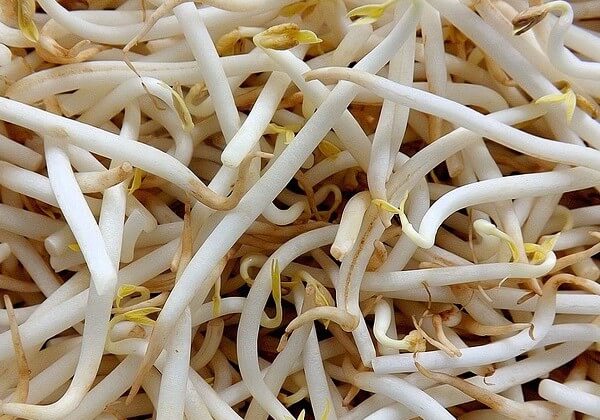
Yes, Bean Sprouts are good for dogs. This vegetable is packed full of iron, calcium, manganese, bioflavonoids, B vitamins, and vitamins A, C, E, and K. Here’s how they help your furry friend’s overall health.
Bean Sprouts health benefits for dogs
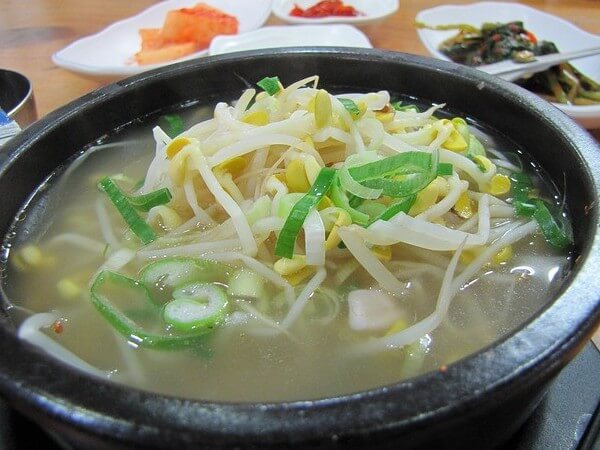
Let’s go over how the above-mentioned vitamins and minerals and how they can help your dog’s health.
Vitamin A improves and maintains a strong immune system in dogs
One of the key vitamins in Bean Sprouts is vitamin A. First, vitamin A helps keep your dog’s immune system strong and healthy by creating a protective mucus that lines their lungs. This prevents your four-legged friends from getting sick easily.
In addition to that, vitamin A also helps maintain proper organ functions. Feeding your furry friends a little bit of Bean Sprouts (typically from mung beans) can support your canine friend’s skin and vision health.
Fun Fact: Butternut Squash is also packed full of vitamin A as well as many other vitamins and minerals. But can dogs enjoy this fruit/vegetable dish? Check out Can Dogs Eat Butternut Squash? to find out!
B vitamins for dogs
Here are some B vitamins in Bean Sprouts.
Vitamin B9 or Folate helps to make healthy red blood cells in dogs
Bean Sprouts are rich in folate. Not only does it help with the formation of red blood cells, but it also promotes healthy cell growth and function in dogs. Folate also creates DNA in dogs. With folate, it helps to maintain healthy eyesight.
Vitamin B6 is vital to hormone regulation and nervous system function in dogs
When dogs eat a moderate amount of Bean Sprouts, they will receive vitamin B6. Vitamin B6 helps your dog with the following:
- Nervous system function.
- Immune system response.
- Gene activation.
- Niacin synthesis.
- Red blood cell function.
- Glucose generation.
- Hormone regulation.
Vitamin B12 or Cyanocobalamin is key to proper functioning of the overall cell system in dogs
Adding vegetables such as Bean Sprouts to your dog’s diet is a good idea because it is one of the crucial vitamins your furry friends will need for healthy growth. The vitamin B12 that your dogs receive can help with the following overall cell system:
- Cell growth.
- Protein synthesis.
- Carbohydrate metabolism.
- Fat metabolism.
- Red blood cells formation.
- Healthy nervous system.
Be sure your four-legged friends are eating their regular dog food because a healthy well-balanced and nutritious diet will help them absorb this essential vitamin B12.
Since vitamin B12 is necessary to your dog’s diet, feel free to add some Bean Sprouts to your dog’s regular meal.
Fun Fact: Organic brown rice also contains B vitamins, but Can Dogs Eat Rice Cakes?
Vitamin C is a great antioxidant for dogs
Another crucial vitamin in Bean Sprouts is vitamin C. Vitamin C is an essential antioxidant that helps with the following:
- Search for harmful free radicals in the dog’s body and attacks them.
- Prevent cognitive aging.
- Slow down the aging process.
- Reduce inflammation.
- Provides immune support for dogs.
The good news is that your dog’s liver makes vitamin C, but it never hurts to supplement their diet with vitamin C and add a small amount of Bean Sprouts to their food.
Vitamin E helps defend against oxidative damage in dogs
When dogs eat a moderate amount of Bean Sprouts, they will receive an essential, fat-soluble nutrient called vitamin E. Not only does it help to maintain a healthy immune system in dogs, but it also stimulates fat metabolism and cell function in dogs.
In addition, dogs will have healthy and strong:
- Heart.
- Muscles.
- Immune system.
- Circulatory system.
- Skin.
- Coat.
- Nerve cell membranes.
- Liver.
- Reproductive system.
Like vitamin C, vitamin E is also an antioxidant which means it can help protect your dog’s cells membranes, DNA, and proteins from damage caused by those obnoxious free radicals.
So if you’re feeding your pooch a small amount of Bean Sprouts, you’re doing your dog a service.
Vitamin K minimizes the risk of coronary heart disease in dogs
Like vitamin E, vitamin K is also a fat-soluble vitamin. With the help of vitamin K, it can help activate the blood’s ability to clot in dogs.
Iron allows your dog’s cells to produce energy
Let’s talk about the minerals in Bean Sprouts. Iron is an essential mineral that allows your dog’s cells to produce energy by carrying oxygen in the hemoglobin of red blood cells throughout his body.
Dogs need certain enzymes in their body to function properly and iron can help with that.
You may be interested in: Can Dogs Eat Crab?
Calcium is an essential mineral that maintains strong teeth and bones in dogs
All dogs need calcium in their diet. This essential mineral not only allows dogs to have strong bones, but also healthier nails, teeth, and hair. The dog’s nervous system will also benefit from calcium intake.
Manganese helps to build strong bones in dogs
Manganese is another mineral that is crucial for our furry friends. Manganese helps to increase bone density in dogs and maintain healthy bone and joint cartilages in dogs so that they have healthy and strong bones for many years to come.
In addition, our canine friends need manganese to make fatty acids, metabolize carbohydrates and protein, and produce energy. Feeding your furry pooch a small amount of Bean Sprouts here is a good idea.
Bioflavonoids reduce anxiety in dogs
Bioflavonoids are present in Bean Sprouts. When the dog’s body receives this nutrient, it uses bioflavonoids to produce other nutrients.
Can dogs have Bean Sprouts?
As we see here, dogs can have Bean Sprouts in moderate amounts as adding Bean Sprouts to your dog’s diet can help improve their overall health. Both vitamin C and vitamin E can also help prevent health issues such as liver failure or kidney disease.
But are Bean Sprouts safe for dogs or can they be bad for our furry friends? Let’s find out.
Are Bean Sprouts bad for dogs?
Yes, Bean Sprouts can be bad for dogs if during cooking and preparation, they were mixed with ingredients that are considered toxic to dogs like onion or garlic.
Adding too much salt onto the Bean Sprouts can also be bad for dogs because it can cause sodium poisoning in dogs.
Keep in mind that a healthy well-nourished 33-pound dog only needs 100 mg of sodium each day and no more than that. Let’s take two different size dogs as an example:
- A 10 pound Chihuahua dog should only have about 30 mg of salt per day.
- A 75 pound Labrador dog should only consume about 227 mg of salt each day.
Keep in mind that your dog’s regular meal will have salt as well. So depending on how much salt your pooch has already consumed, adding more salty food to his diet can tip over the salt intake limit for the day.
Signs and symptoms of salt toxicity in dogs include:
- Extreme thirst due to the high amount of salt intake.
- Drinking a lot of water leads to frequent urination.
- Nausea leading to vomiting.
- Watery or loose diarrhea.
- Convulsions.
- Mouth and tongue swelling.
- Lethargic or lack of energy.
- Muscle tremors and spasms.
- Headache.
- Loss of appetite.
- Abnormal amount of fluid buildup in the dog’s body.
- Increased heartbeat (tachycardia).
- Confusion and walking around in a drunk-like manner.
- Fever.
- Upset stomach.
- Abdominal pain causing your dog to hunch over.
- Breathing difficulty or respiratory distress.
- Overall weakness.
If you suspect your dog has salt poisoning, be sure to contact your vet right away. Sodium poisoning requires immediate medical attention. While waiting for your vet’s instruction, it’s important that you provide your furry pals with fresh cool water. Make sure the bowl of water is easily accessible to your furry friends.
Your vet may ask you to bring your pups in for a physical examination or checkup and they may take blood samples and administer appropriate treatments such as IV fluids to keep your precious pups hydrated.
Bean Sprouts can also be bad for dogs if your dogs ate too much of this vegetable. As always, moderation is key. Consuming too much of something is not only unsafe and unhealthy for dogs, but can also lead to an upset stomach or gastrointestinal upset in dogs.
Handy Hint: If your dog is acting wobbly or drunk, you’ll want to consult with your vet immediately. There could be many reasons that are causing your pooch to walk in a drunk-like manner. Check out My Dog Is Acting Drunk And Wobbly to learn more!
How to properly prepare Bean Sprouts for your canine friends
Dog owners can cook the Bean Sprouts or leave them raw if they plan to give a little to their furry friends. You can chop the Bean Sprouts into small pieces and sprinkle them on top of your dog’s regular food.
If you homemade your dog’s meal, you can include some cooked Bean Sprouts into their well-balanced protein diet.
Unlike other human foods that are only safe as an occasional treat or snack, our K9 pals can eat Bean Sprouts every day, however, make sure you give them small moderate amounts. Like Brussel Sprouts, when dogs eat a lot of Bean Sprouts, they can become very gassy.
So, can dogs eat Bean Sprouts?
Absolutely! You can feed your K9 friends Bean Sprouts daily but be sure it is in moderation. As we can see, this superfood vegetable is packed full of vitamins, minerals, and nutrients that are helpful to your dog’s overall health.
If you plan on giving your pooch some raw or cooked Bean Sprouts, make sure they are plain with no added salt, ingredients, or flavoring. Too much salt can cause salt poisoning in dogs. Also, avoid mixing Bean Sprouts with ingredients that are toxic to dogs.
DISCLAIMER: THIS WEBSITE DOES NOT PROVIDE MEDICAL ADVICE
The information, including but not limited to, text, graphics, images and other material contained on this website are for informational purposes only. No material on this site is intended to be a substitute for professional veterinary advice, diagnosis, or treatment. Always seek the advice of your veterinarian or other qualified health care provider with any questions you may have regarding dietary needs.
Resources:
https://en.wikipedia.org/wiki/Mung_bean_sprout
https://www.healthline.com/nutrition/raw-sprouts#TOC_TITLE_HDR_2

With over five years of specialized experience as an animal writer, my expertise lies in dog nutrition, health, behavior, grooming, and training. I am dedicated to delivering helpful and informative content that caters to the well-being of our furry friends. My primary goal is to empower pet owners with knowledge and ensure our canine companions thrive in health and happiness. In my free time, I love volunteering at local dog rescue centers.
